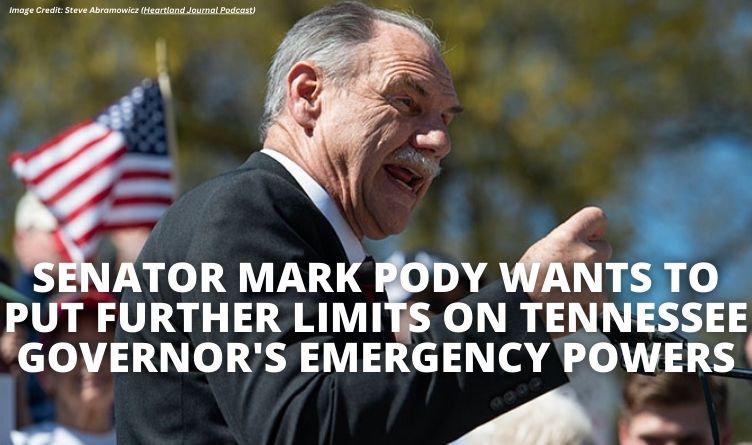Sen. Pody obtains opinion from attorney general on separation of powers.
Image: Sen. Mark Pody speaks at The Tennessee Conservative’s ‘Protect Tennessee’s Borders Rally‘ in Nashville Image Credit: Steve Abramowicz (Heartland Journal Podcast)
By Sam Stockard [The Tennessee Lookout-CC BY-NC-ND 4.0] –
A Tennessee senator is planning an effort to limit the governor’s authority during state emergencies after obtaining an attorney general’s opinion on the separation of powers.
Republican Sen. Mark Pody of Lebanon, whose district takes in an eastern portion of Davidson County, told the Tennessee Lookout he’s concerned about the potential for the governor to override the Legislature with orders that have the power of law after the COVID-19 pandemic, based on a state of emergency measure passed in 2000.
“I just didn’t think the governor should have the authority to supersede our constitutional rights,” Pody said.

Lawmakers questioned the governor’s rulemaking power during the pandemic and dialed back some of the office’s power afterward, for instance, passing a bill to limit emergency orders to 45 days instead of 60.
Another bill prohibited the state and governor from requiring COVID-19 vaccinations, though Lee only encouraged people to be vaccinated during the pandemic. They also cut the ability of independent health departments in the state’s six largest counties to make their own rules, mainly in regard to mask requirements and vaccinations.
Pody noted the Legislature’s 2000 bill “carved out” the Second Amendment dealing with gun laws, but not the First Amendment on free speech and assembly, and he added, “this was very concerning to me.”
Numerous churches protested social distancing requirements ordered by the governor during the pandemic, claiming they violated their rights to gather for worship.
The opinion Pody obtained Aug. 13 from Attorney General Jonathan Skrmetti says under the state’s separation of power doctrine, the General Assembly cannot delegate its power to make laws, except in two “narrow” instances, apparently dealing with state emergencies and rule making. That came in response to Pody’s question about whether the Legislature has the authority to delegate its lawmaking power to another department since the Constitution prohibits the executive and judicial branches from exercising legislative authority.
In response to whether the Legislature can delegate the power the make rules and regulations that have the “force of law,” the attorney general’s opinion says while the Legislature “may not delegate its lawmaking power to an executive branch agency, it may delegate ‘the authority to implement the expressed policy of particular statutes’ i.e. executive power.” The opinion notes that authority includes the power to put rules and regulations in place that have “the effect of law in [an] agency’s area of operation.”
The opinion further says the Legislature can grant the governor emergency power as long as it “is executive, not legislative, in nature.” And it adds, “Moreover, the governor’s constitutionally vested executive power may inherently include emergency power; if that is correct, then it would not offend the separation of powers doctrine …”
Asked about the matter Wednesday, Gov. Bill Lee said, “It’s pretty clear in statute where those separation of powers exist and what those powers actually are, and I don’t anticipate any change there.”

Pody acknowledged he felt Lee handled the situation well and declined to criticize his actions. Yet Pody said he disagreed with decisions that closed small businesses that were deemed “non-essential” such as hardware stores while allowing big-box stores such as Home Depot and Lowe’s to keep operating.
In case of another emergency situation, such as a natural disaster, Pody said he wants to make sure the declaration of an emergency doesn’t supplant the Legislature’s constitutional authority.
The governor declared a state of emergency in March 2020 allowing him to suspend certain laws, rules and regulations to stop the spread of COVID-19. He followed that with about 35 orders designed to keep people from gathering in large groups, including allowing local government entities to meet electronically.
The governor made an order prohibiting gatherings of 10 or more people, eating and drinking at restaurants and bars, visiting gyms and fitness centers, going to nursing and retirement homes and encouraging people to use electronic communication, in addition to protecting older people with compromised immune systems. Churches were affected by this order, drawing opposition from groups that felt the government shouldn’t control religious activities.
The order didn’t mandate sheltering in place or going to grocery stores and gas stations but said people should work from home when possible. It also set up rules to allow take-home alcoholic beverages, since most restaurants were prohibited from having customers sit down to eat and drink.
Another order limited non-emergency healthcare procedures and dealt with the transport of food supplies and disinfectants.
The governor ran into more opposition when he issued an order shutting down “close-contact” operations such as barber shops and hair salons, in addition to nightclubs, concert venues, racetracks, indoor children’s play areas and adult entertainment venues.

An April 2 order required people to stay at home except when engaging in “essential activity or essential services.”
One order was designed to stop price-gouging, and others were supposed to allow retired healthcare workers to resume work with renewal of licenses granted by the state. In one order, inspections of pain management clinics, healthcare facilities and pharmaceutical facilities were suspended.
The governor issued separate orders on June 1, 2020 to stop rioting in downtown Nashville and then in Memphis, including mobilizing the National Guard.
A July 6 order encouraged people to wear cloth masks to prevent the spread of COVID-19 and gave local governments the ability to adopt their own rules for masks, excluding the health departments of the state’s six largest counties, which operate independently. This created confrontation in Metro Nashville where mask orders were put in place, angering downtown business owners.
School districts also were urged to adopt face-covering policies as students prepared to return to class that August. Most schools closed toward the end of the 2019-20 school year in an attempt to stop the spread of COVID.
Prohibitions on spectator attendance at school athletic events, limits on social gatherings and recommendations for houses of worship to avoid large gatherings continued into December 2020.
The governor issued an order for a limited state emergency in August 2021, and eventually restrictions were softened and finally lifted.


About the Author: Sam Stockard is a veteran Tennessee reporter and editor, having written for the Daily News Journal in Murfreesboro, where he served as lead editor when the paper won an award for being the state’s best Sunday newspaper two years in a row. He has led the Capitol Hill bureau for The Daily Memphian. His awards include Best Single Editorial from the Tennessee Press Association. Follow Stockard on Twitter @StockardSam


